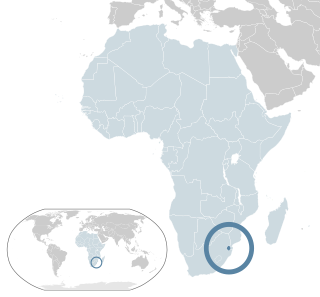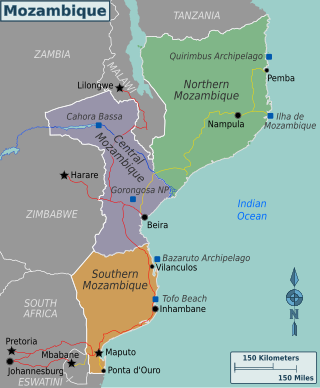
Eswatini, officially the Kingdom of Eswatini and formerly named Swaziland, is a landlocked country in Southern Africa. It is bordered by Mozambique to its northeast and South Africa to its north, west, south, and southeast. At no more than 200 km (120 mi) north to south and 130 km (81 mi) east to west, Eswatini is one of the smallest countries in Africa; despite this, its climate and topography are diverse, ranging from a cool and mountainous highveld to a hot and dry lowveld.

HIV/AIDS originated in Africa during early 20th century and is a major public health concern and cause of death in many African countries. AIDS rates varies significantly between countries, though the majority of cases are concentrated in Southern Africa. Although the continent is home to about 15.2 percent of the world's population, more than two-thirds of the total infected worldwide – some 35 million people – were Africans, of whom 15 million have already died. Eastern and Southern Africa alone accounted for an estimate of 60 percent of all people living with HIV and 70 percent of all AIDS deaths in 2011. The countries of Eastern and Southern Africa are most affected, AIDS has raised death rates and lowered life expectancy among adults between the ages of 20 and 49 by about twenty years. Furthermore, the life expectancy in many parts of Africa is declining, largely as a result of the HIV/AIDS epidemic with life-expectancy in some countries reaching as low as thirty-nine years.

Mswati III is the King of Eswatini and head of the Swazi royal family. He was born in Manzini in the Protectorate of Swaziland to King Sobhuza II and one of his younger wives, Ntfombi Tfwala. He was crowned as Mswati III, Ingwenyama and King of Swaziland, on 25 April 1986 at the age of 18, thus becoming the youngest ruling monarch in the world at that time. Together with his mother, Ntfombi Tfwala, now Queen Mother (Ndlovukati), he rules the country as an absolute monarch. Mswati III is known for his practice of polygamy and currently has 15 wives.

HIV/AIDS in India is an epidemic. The National AIDS Control Organisation (NACO) estimated that 2.14 million people lived with HIV/AIDS in India in 2017. Despite being home to the world's third-largest population of persons with HIV/AIDS, the AIDS prevalence rate in India is lower than that of many other countries. In 2016, India's AIDS prevalence rate stood at approximately 0.30%—the 80th highest in the world. Treatment of HIV/AIDS is primarily via a "drug cocktail" of antiretroviral drugs and education programs to help people avoid infection.

HIV/AIDS is one of the most serious health concerns in South Africa. The country has the highest number of people afflicted with HIV of any country, and the fourth-highest adult HIV prevalence rate, according to the 2019 United Nations statistics.
Young Heroes is a charity, based in Mbabane, Swaziland. With a focus on orphaned and vulnerable children and their elderly caretakers, Young Heroes directly addresses the HIV/AIDS epidemic in Swaziland — the nation with the world’s highest rate of infection — on three fronts: education and prevention; healthcare; and impact mitigation/poverty reduction.

Lesbian, gay, bisexual, and transgender (LGBT) rights in Eswatini are limited. LGBT people face legal challenges not experienced by non-LGBT residents. According to Rock of Hope, a Swati LGBT advocacy group, "there is no legislation recognising LGBTIs or protecting the right to a non-heterosexual orientation and gender identity and as a result [LGBT people] cannot be open about their orientation or gender identity for fear of rejection and discrimination". Homosexuality is illegal in Eswatini, though this law is in practice unenforced. According to the 2021 Human Rights Practices Report from the US Department of State, "there has never been an arrest or prosecution for consensual same-sex conduct."

The Democratic Republic of the Congo was one of the first African countries to recognize HIV, registering cases of HIV among hospital patients as early as 1983.

HIV/AIDS in Lesotho constitutes a very serious threat to Basotho and to Lesotho's economic development. Since its initial detection in 1986, HIV/AIDS has spread at alarming rates in Lesotho. In 2000, King Letsie III declared HIV/AIDS a natural disaster. According to the Joint United Nations Programme on HIV/AIDS (UNAIDS) in 2016, Lesotho's adult prevalence rate of 25% is the second highest in the world, following Eswatini.
HIV/AIDS in Eswatini was first reported in 1986 but has since reached epidemic proportions. As of 2016, Eswatini had the highest prevalence of HIV among adults aged 15 to 49 in the world (27.2%).

Mozambique is a country particularly hard-hit by the HIV/AIDS epidemic. According to 2008 UNAIDS estimates, this southeast African nation has the 8th highest HIV rate in the world. With 1,600,000 Mozambicans living with HIV, 990,000 of which are women and children, Mozambique's government realizes that much work must be done to eradicate this infectious disease. To reduce HIV/AIDS within the country, Mozambique has partnered with numerous global organizations to provide its citizens with augmented access to antiretroviral therapy and prevention techniques, such as condom use. A surge toward the treatment and prevention of HIV/AIDS in women and children has additionally aided in Mozambique's aim to fulfill its Millennium Development Goals (MDGs). Nevertheless, HIV/AIDS has made a drastic impact on Mozambique; individual risk behaviors are still greatly influenced by social norms, and much still needs to be done to address the epidemic and provide care and treatment to those in need.

Rwanda faces a generalized epidemic, with an HIV prevalence rate of 3.1 percent among adults ages 15 to 49. The prevalence rate has remained relatively stable, with an overall decline since the late 1990s, partly due to improved HIV surveillance methodology. In general, HIV prevalence is higher in urban areas than in rural areas, and women are at higher risk of HIV infection than men. Young women ages 15 to 24 are twice as likely to be infected with HIV as young men in the same age group. Populations at higher risk of HIV infection include people in prostitution and men attending clinics for sexually transmitted infections.
HIV/AIDS is considered the deadliest epidemic in the 21st century. It is transmitted through sex, intravenous drug use and mother-to-child transmission. Zambia is experiencing a generalized HIV/AIDS epidemic, with a national HIV prevalence rate of 11.3% among adults ages 15 to 49 as of 2018. Per the 2000 Zambian census, the people affected by HIV/AIDS constituted 15% of the total population, amounting to one million, of which 60% were women. The pandemic results in increased number of orphans, with an estimated 600,000 orphans in the country. It was prevalent more in urban areas compared to rural and among all provinces, Copperbelt Province and Lusaka Province had higher occurrence.
Honduras is the Central American country most adversely affected by the HIV/AIDS epidemic. It is estimated that the prevalence of HIV among Honduran adults is 1.5%.
Prostitution in Eswatini is illegal, the anti-prostitution laws dating back to 1889, when the country Eswatini was a protectorate of South Africa. Law enforcement is inconsistent, particularly near industrial sites and military bases. Police tend to turn a blind eye to prostitution in clubs. There are periodic clamp-downs by the police.

Eswatini, Africa's last remaining absolute monarchy, was rated by Freedom House from 1972 to 1992 as "Partly Free"; since 1993, it has been considered "Not Free". During these years the country's Freedom House rating for "Political Rights" has slipped from 4 to 7, and "Civil Liberties" from 2 to 5. Political parties have been banned in Eswatini since 1973. A 2011 Human Rights Watch report described the country as being "in the midst of a serious crisis of governance", noting that "[y]ears of extravagant expenditure by the royal family, fiscal indiscipline, and government corruption have left the country on the brink of economic disaster". In 2012, the African Commission on Human and Peoples' Rights (ACHPR) issued a sharp criticism of Eswatini's human-rights record, calling on the Swazi government to honor its commitments under international law in regards to freedom of expression, association, and assembly. HRW notes that owing to a 40% unemployment rate and low wages that oblige 80% of Swazis to live on less than US$2 a day, the government has been under "increasing pressure from civil society activists and trade unionists to implement economic reforms and open up the space for civil and political activism" and that dozens of arrests have taken place "during protests against the government's poor governance and human rights record".
Siphiwe Hlophe is the co-founder of Swaziland for Positive Living, an NGO that provides counselling and education, and seeks to improve the living conditions of people who are affected by or infected with HIV in the rural areas. The organisation has been described as "Swaziland's most innovative and motivated HIV/AIDS mitigation programme". She is also the President of Positive Women, a UK-based charity founded by Kathryn Llewellyn and Stephen Brown
Positive Women is a registered UK international development charity working in UK and Eswatini. The charity works to improve the lives women and children affected by the HIV/Aids virus, which is particularly prevalent in Eswatini Positive Women manages and develops a number of projects through its partner NGO Eswatini for Positive Living or ESWAPOL which is based in Manzini, Eswatini. It focuses its efforts on education, income generation and creating healthier communities.
HIV/AIDS in Bhutan remains a relatively rare disease among its population. It has, however, grown into an issue of national concern since Bhutan's first reported case in 1993. Despite preemptive education and counseling efforts, the number of reported HIV/AIDS cases has climbed since the early 1990s. This prompted increased government efforts to confront the spread of the disease through mainstreaming sexually transmitted disease (STD) and HIV prevention, grassroots education, and the personal involvement of the Bhutanese royal family in the person of Queen Mother Sangay Choden.

The AIDS Support Organization (TASO) is an indigenous HIV and AIDS service initiative, registered in Uganda as a non-governmental organisation. It is a pioneer non-public actor in the HIV and AIDS response in Uganda. TASO is a membership organisation with over 4,000 subscriber members.